5 Cybersecurity Career Paths (and How to Get Started)
A career in cybersecurity can go in many directions. Learn about five popular career paths.
![[Featured image] A cybersecurity engineer in a blue long-sleeve shirt stands in an open office space holding their tablet.](https://d3njjcbhbojbot.cloudfront.net/api/utilities/v1/imageproxy/https://images.ctfassets.net/wp1lcwdav1p1/4piLyZVBzLHSiG7JKtHIq1/e12fe3f735986c2aa23bf2e7b0e5499f/cybersecurity_career_path.png?w=1500&h=680&q=60&fit=fill&f=faces&fm=jpg&fl=progressive&auto=format%2Ccompress&dpr=1&w=1000)
Pursuing a career in cybersecurity means joining a booming industry where available jobs outnumber qualified candidates. According to the US Bureau of Labor Statistics (BLS), the number of cybersecurity jobs is expected to increase by 33 percent between 2023 and 2033 [1]. If you're interested in a fast-paced, well-paid career focused on protecting valuable data and computer systems, a career in cybersecurity could be right for you. In the following article, learn about five common career paths within this high-demand field.
Or, get started immediately and earn credentials from an industry leader in as little as six months with the Google Cybersecurity Professional Certificate program, where you'll learn to identify common risks, threats, and vulnerabilities, as well as techniques to mitigate them.
Cybersecurity career path starting roles
Many cybersecurity professionals start out in an entry-level IT role to gain experience before moving into the cybersecurity specialization. If you don't yet have experience with computer science or information technology, you'll need to develop core IT skills such as programming, networks and systems administration, and cloud computing. Then, you might pursue one of the following entry-level jobs:
If you already have some experience in the field, you may go straight to an entry-level cybersecurity role such as:
In an analyst role, you can take your career in a few different directions, depending on your interests and goals. You may pursue security engineering and architecture if you enjoy planning and building. Maybe you enjoy the thrill of incident response, or perhaps you’d prefer to hone your hacking skills to stay one step ahead of bad actors. While you don’t necessarily need a degree to get a job in cybersecurity, having one or some form of structured training, such as certificate programs or online classes, might accelerate your path toward a job.
5 career paths for an information security analyst
Whether you're just getting started or looking to take the next step, there are multiple directions for your career, each with its own focus, challenges, and opportunities. In the sections below, we’ll break down five key career paths in cybersecurity. Understanding these options can help you make informed choices about where you want to grow and how to get there.
1. Engineering and architecture
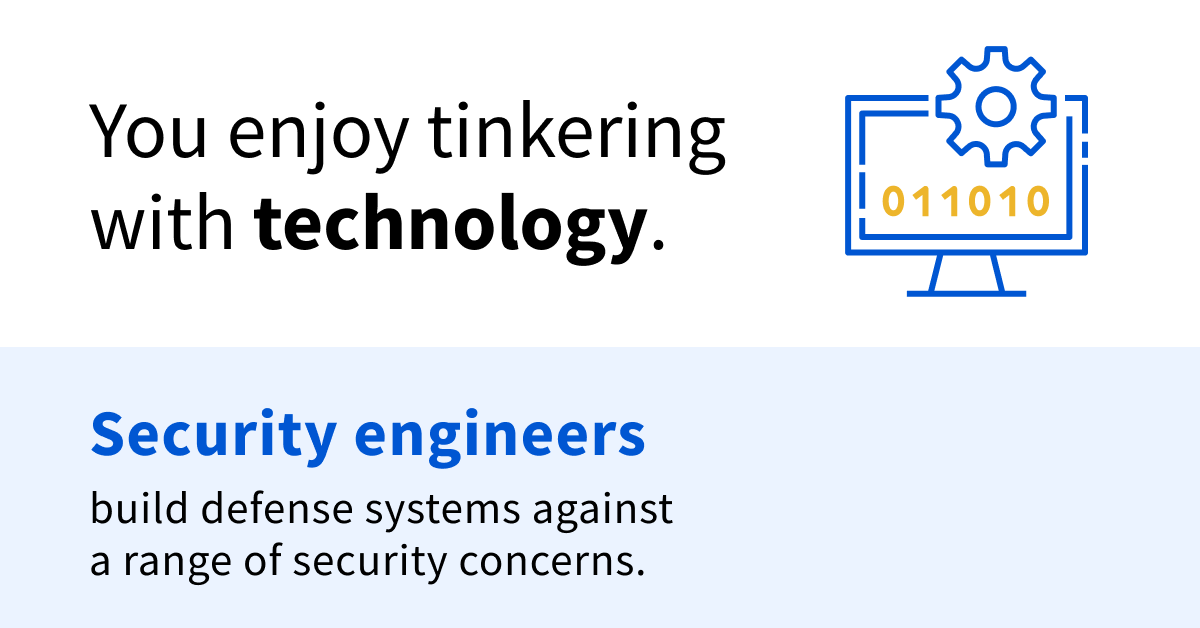
As a security engineer, you’ll use your knowledge of threats and vulnerabilities to build and implement defense systems against various security concerns. You may advance to become a security architect, responsible for your organization's entire security infrastructure.
Security engineering and architecture could be a good fit if you enjoy tinkering with technology and like to take a big picture approach to cybersecurity.
Skills to develop:
Critical thinking
IT networking
System administration
Risk assessment
Common certifications: CompTIA Security+, Systems Security Certified Practitioner (SSCP), Certified Information Systems Security Professional (CISSP), Google Professional Cloud Security Engineer
2. Incident response
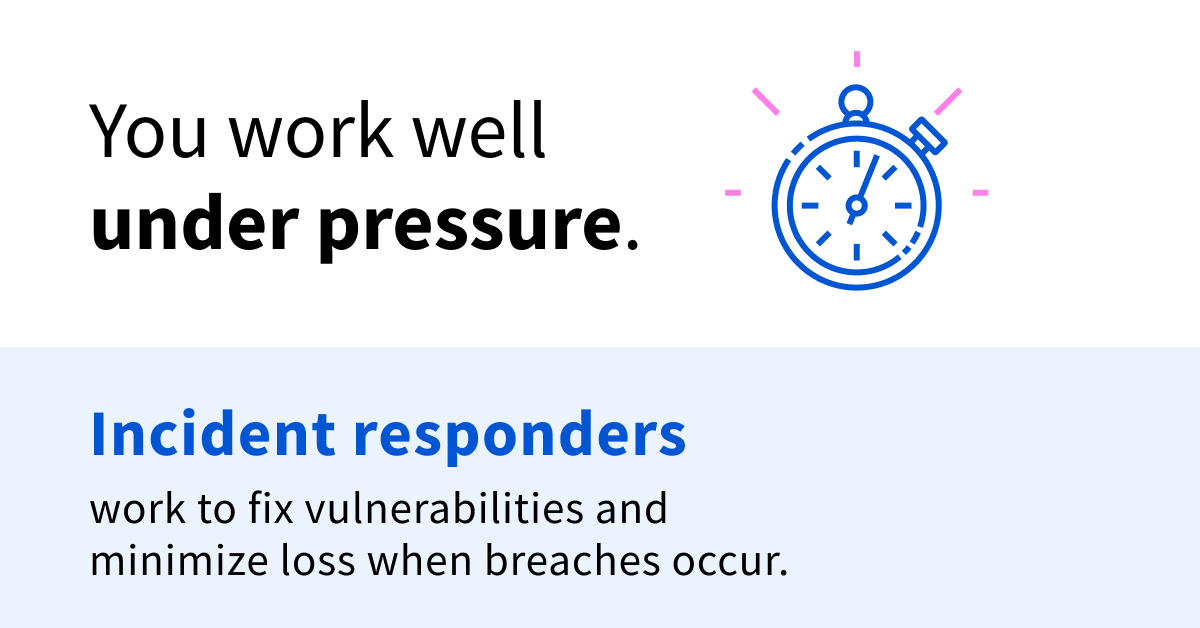
Despite a company’s best security efforts, security incidents still happen. The field of incident response involves the next steps after a security incident. As an incident responder, you’ll monitor your company’s network and work to fix vulnerabilities and minimize loss when breaches occur.
Another area of incident response involves digital forensics and cybercrime. Digital forensic investigators work with law enforcement to retrieve data from digital devices and investigate cybercrimes.
Incident response could be a good fit if you work well under pressure and love a good mystery.
Skills to develop:
Attention to detail
Technical writing and documentation
Intrusion detection tools
Forensics software
Common certifications: GIAC Certified Incident Handler (GCIH), EC-Council Certified Incident Handler (ECIH), Certified Computer Examiner (CCE), Certified Computer Forensics Examiner (CCFE)
Learn about threat analysis, investigation, and response with the Cisco Cybersecurity Operations Fundamentals Specialization.
3. Management and administration
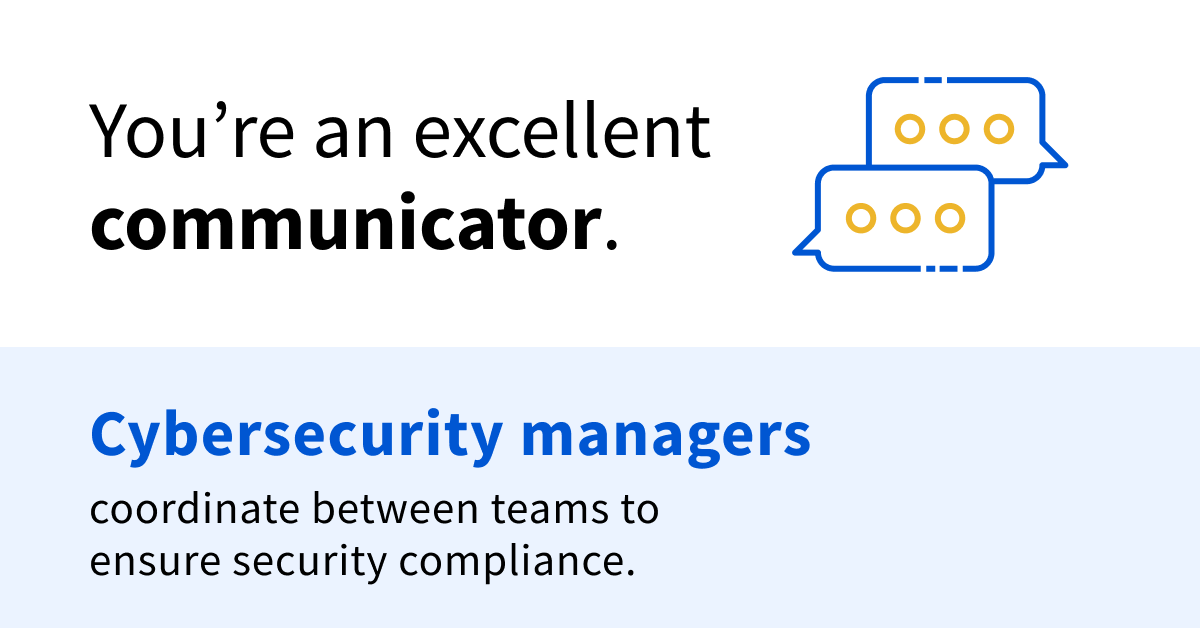
As you gain experience in cybersecurity, you may choose to advance toward a leadership position within your organization. Cybersecurity managers oversee an organization’s network and computer security systems. In this role, you might manage security teams, coordinate between teams, and ensure security compliance. Typically, the highest security role in an organization is that of chief information security officer (CISO). Working in security at the executive level often means managing operations, policies, and budgets across the company’s security infrastructure.
Management and administration could be a good fit if you’re organized, an excellent communicator, and enjoy working with people.
Skills to develop:
Project management
Risk management
Leadership
Collaboration
Common certifications: Certified Information Security Manager (CISM), GIAC Certified Project Manager (GCPM), CISSP (Certified Information Systems Security Professional)
4. Consulting
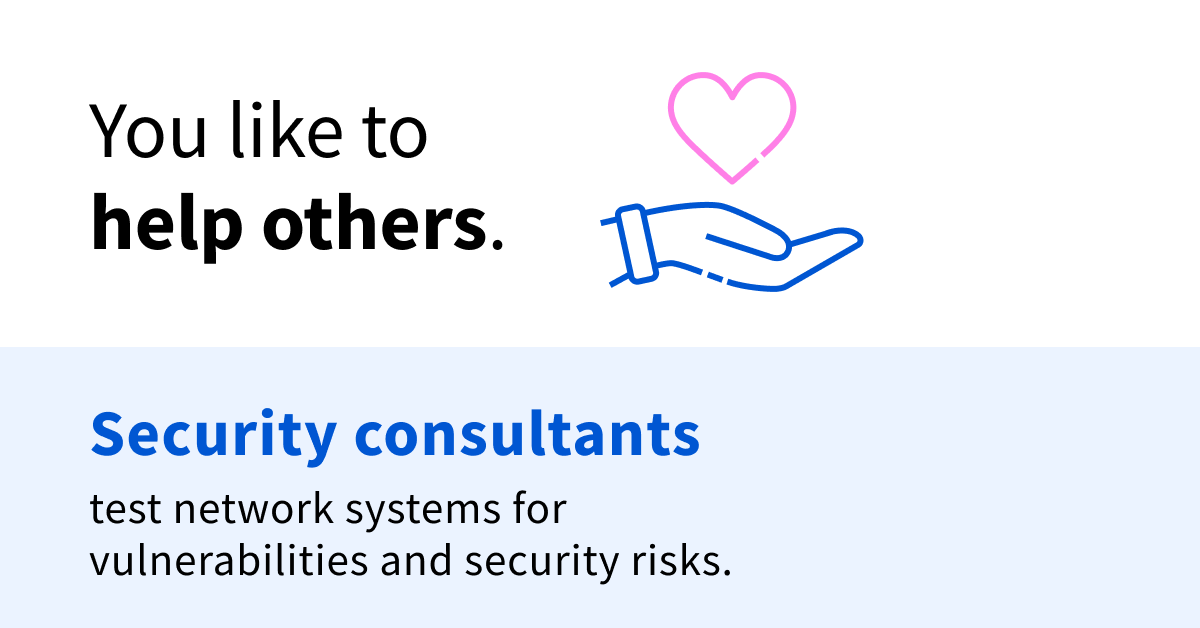
Companies hire security consultants to test their computer and network systems for vulnerabilities or security risks. In this role, you get to practice cybersecurity offense and defense by testing systems for vulnerabilities and recommending how to strengthen those systems.
Consulting could be a good fit if you enjoy variety and want to make an impact by helping others manage their security.
Skills to develop:
Penetration testing and vulnerability testing
Threat management
Operating systems
Encryption
Common certifications: CompTIA Security+, Offensive Security Certified Professional (OSCP), Systems Security Certified Practitioner (SSCP), Certified Security Consultant (CSC)
5. Testing and hacking
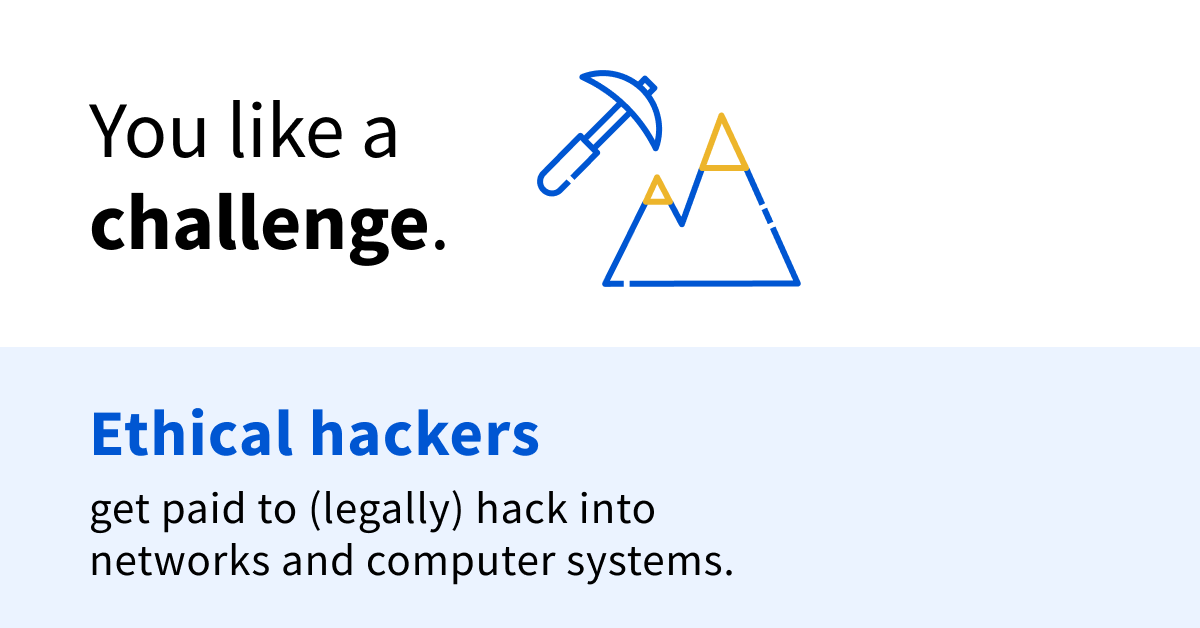
This field of cybersecurity goes by many names, including offensive security, red team, white hat hacking, and ethical hacking. If you work in offensive security, you’ll take a proactive approach to cybersecurity. You’ll play the part of the intruder, trying to find vulnerabilities before the bad guys do.
As a penetration tester, you’ll seek to identify and exploit system weaknesses to help companies build more secure systems. As an ethical hacker (also known as a white hat hacker), you can try out even more attack vectors (like social engineering) to reveal security weaknesses.
Testing and hacking could be a good fit if you want to outsmart the bad guys and get paid to (legally) hack into networks and computer systems.
Skills to develop:
Penetration testing
Computer networking
Scripting
Common certifications: Certified Ethical Hacker (CEH), CompTIA PenTest+, GIAC Penetration Tester (GPEN), Offensive Security Certified Professional (OSCP)
How much can you make? Cybersecurity salaries by role
Cybersecurity professionals tend to get paid well for their skills, even at the entry level. As you gain experience and move into more advanced roles, salaries also often increase. To give you an idea of what’s possible, here’s a look at the average total pay of several cybersecurity jobs in the US in May 2025, according to Glassdoor.
Intrusion detection specialist: $127,396
Junior cybersecurity analyst: $138,832
Digital forensic examiner: $132,161
IT security administrator: $108,266
Incident response analyst: $97,322
Cybersecurity consultant: $118,837
Information security analyst: $105,299
Ethical hacker: $123,085
Penetration tester: $112,372
Security engineer: $128,106
Cybersecurity manager: $179,674
Security architect: $164,097
Chief information security officer: $197,579
Cybersecurity degrees and certifications
Fifty-six percent of cybersecurity specialists have a bachelor's degree, and 23 percent have an associate degree [2]. Relevant areas of study include computer science, computer information systems, and information technology. In cybersecurity, the correct credentials can help set you apart from other job seekers and make your resume more attractive to hiring managers.
![[Video Thumbnail] Which Cybersecurity Certificate is Right for You?](https://d3njjcbhbojbot.cloudfront.net/api/utilities/v1/imageproxy/https://images.ctfassets.net/wp1lcwdav1p1/5oXFYMZ9H4a4yhwpVqFHiN/784d3a17e8d6078bf288a2c708b14d8c/RC_Dakota_-_Comparison_Cybersecurity_-_Thumbnail.png?auto=format%2Ccompress&dpr=1&w=750&h=450&q=60)
Resources
Get started in cybersecurity.
If you’re interested in starting a career in cybersecurity, consider the Google Cybersecurity Professional Certificate. You'll learn the importance of protecting networks, devices, people, and data from unauthorized access and cyberattacks using Security Information and Event Management (SIEM) tools.
Article sources
US Bureau of Labor Statistics. "Information Security Analysts, https://www.bls.gov/ooh/computer-and-information-technology/information-security-analysts.htm." Accessed May 23, 2025.
Zippia. "Cybersecurity specialist jobs, https://www.zippia.com/cyber-security-specialist-jobs/education/." Accessed May 23, 2025.
Coursera Staff
Editorial Team
Coursera’s editorial team is comprised of highly experienced professional editors, writers, and fact...
This content has been made available for informational purposes only. Learners are advised to conduct additional research to ensure that courses and other credentials pursued meet their personal, professional, and financial goals.